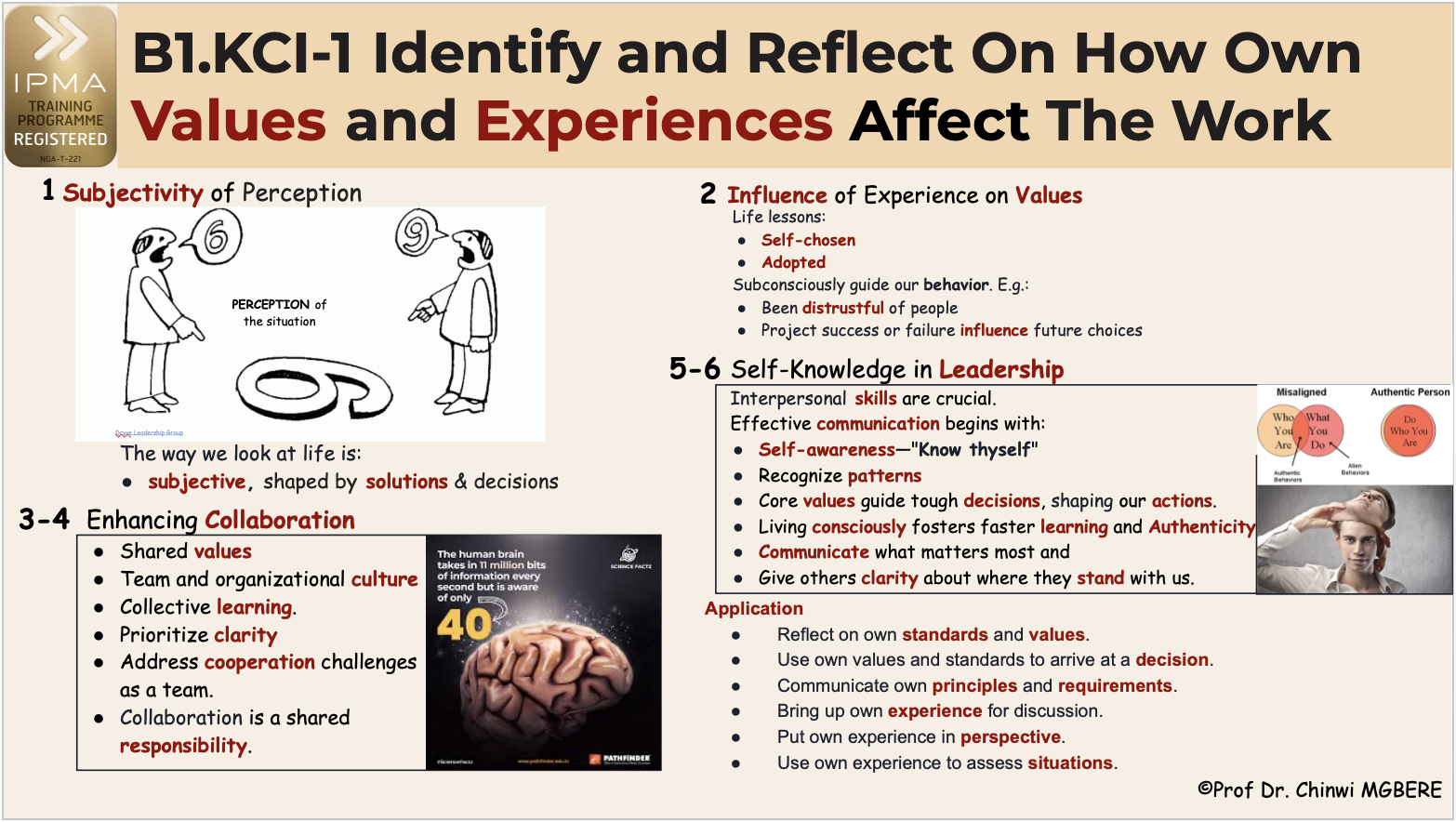- Reflect on your standards and values.
- Use your standards and values to arrive at a decision.
- Communicate about your principles and requirements.
- Bring up your own experience for discussion.
- Put your own experience into perspective.
- Use your experience to assess situations.
45min.

B1.KCI-1. Understand how our values and experience influence the way we work
- You cannot find two people with the same perception of a particular situation. Every person perceives something from his frame of reference. The solutions we found to problems and the decisions we made in difficult circumstances shaped us into who we are and determined how we now look at life. Usually, we are unaware of the subjectivity involved in each perception. We think we are objective, but the opposite is true. Our interpretation of reality depends very much on our experience and the knowledge we have acquired, which has created our frame of reference – this is not the objective reality.
-
Every person has developed a set of values and moral standards, some of which are self-chosen and others taken over from the group of people we are part of. Values and standards are the consequence of all important life lessons. Consciously and subconsciously, they form a guiding principle for our behaviour. Has this led to you becoming distrustful of other people? Was your first project a success or precisely the opposite? All these experiences have, without any doubt, consequences on how we behave in certain similar situations.
-
We believe that our values and standards are better than those of our colleagues, but our colleagues think the same about theirs. To cooperate, we must have something in common, and therefore, we have to share values and standards. Otherwise, it will not work. This is how organisations and teams develop their culture. Culture is the result of a common learning process.
-
How we give an event meaning, therefore, builds further on everything we have ever experienced in the past. To what extent are we conscious that our perception is always subjective? All that we perceive is highly influenced by our experience. Next to that, compared to all the information that is entering our five senses, the brain has only a limited capacity to process it all. Because of that, we communicate less effectively than we think. This is a task to work on first, and when cooperation is not ideal, we can discuss it with our team. This is the responsibility of all team members, as we cooperate by working together.
-
The skills of dealing with and associating with other people form an essential part of this project management competence. We can only communicate effectively when we have sufficient self-knowledge, and that begins with a consciousness of all those experiences that have formed who we are. "Knowing Thyself" is the key to self-management, and experience is, that we recognise behavioural patterns and know how to react to them. If we live more consciously, then we learn more quickly, and therefore, we must reflect on how our values and standards determine our behaviour.
-
What do we stand for? What is part of us and what is not? When facing difficult decisions, it is our key values that lead us to, what we think is the right choice. When we know what is important to us, and we communicate that, then people know where they stand with us because we are then authentic.
Application
You can convert the above into actions on the project/programme/portfolio for which you are currently responsible by carrying out the following steps:
- Reflect on your standards and values.
- Use your standards and values to arrive at a decision (choice).
- Communicate your principles and requirements.
- Bring up your own experience for discussion.
- Put your own experience into perspective.
- Use your experience to assess situations.
Remark:
The human body sends 11 million bits per second to the brain for processing, yet the conscious mind seems to be able to process only 50 bits per second. It appears that a tremendous amount of compression is taking place if 11 million bits are being reduced to less than 50.
[ARAS/RAS] - https://en.wikipedia.org/wiki/Reticular_formation#Ascending_reticular_activating_system


